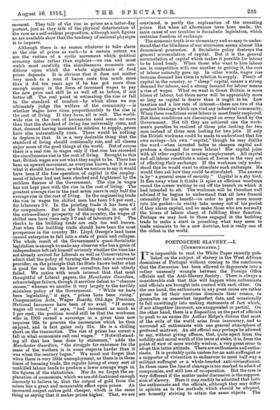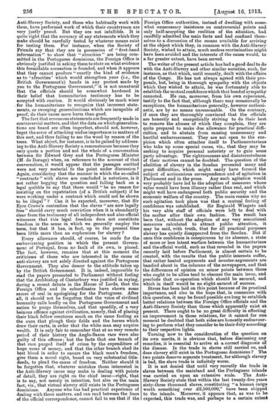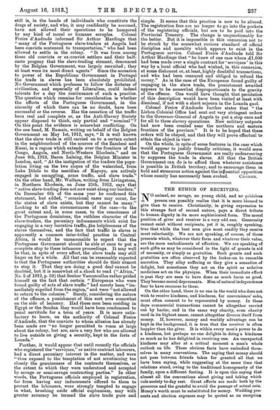I T is impossible to road the White Paper recently pub-
lished on the subject of slavery in the West African dominions of Portugal 'without coming to the conclusion that the discussion °has been allowed to degenerate into a rather unseemly wrangle between the Foreign Office officials and the Anti-Slavery Society. There is always a considerable risk that this will happen when enthusiasts and officials are brought into contact with each other. On the one hand, the enthusiasts in any great cause are rather prone to let their emotions dominate their reason, to generalize on somewhat imperfect data, and occasionally to fall unwittingly into making statements of fact which, if not altogether incorrect, are exaggerated or partial. On the other hand, there is a disposition on the part of officials to push to an excess Sir Arthur Helps's dictum that most of the evils of the world arise from inaccuracy, and to surround all enthusiasts with one general atmosphere of profound mistrust. An old official may perhaps be allowed to say, without giving offence, that, quite apart from the nobility and moral worth of the issue at stake, it is, from the point of view of mere worldly wisdom, a very great error to adopt this latter attitude. There are enthusiasts and enthu- siasts. It is probably quite useless for an anti-suffragist or a supporter of vivisection to endeavour to meet half-way a militant suffragist or a whole-hearted anti-vivisectionist. In these cases the line of cleavage is too marked to admit of compromise, and still less of co-operation. But the case is very different if the matter under discussion is the suppres- sion of slavery. Here it may readily be admitted that both the enthusiasts and the officials, although they may differ in opinion as to the methods which should be adopted, are honestly striving to attain the same objects. The Anti-Slavery Society, and those who habitually work with them, have performed work of which their countrymen are justly ustly proud. But they are not infallible. It is quite right that the accuracy of any statements which they make should be carefully tested by whatever means exist for testing them. For instance, when the Society of Friends say that they are in possession of " first-hand information" to show that " atrocities " are being com- mitted in the Portuguese dominions, the Foreign Office is obviously justified in asking them to state on what evidence this formidable accusation is founded, and when it appears that they cannot produce " exactly the kind of evidence as to ' atrocities' which would strengthen your (i.e., the British Government's) hands in any protest made by you to the Portuguese Government," it is not unnatural that the officials should be somewhat hardened in their belief that humanitarian testimony has to be accepted with caution. It would obviously be much wiser for the humanitarians to recognize that incorrect state- ments, or sweeping generalizations which are incapable of proof, do their cause more harm than good.
The fact that erroneous statements are frequently made in controversial matters, and that the data on which generaliza- tions are based are often imperfect, should not, however, beget the error of attaching undue importance to matters of this sort, and thus failing to see the wood by reason of the trees. What object, for instance, is to be gained by address- ing to the Anti-Slavery Society a remonstrance because they only quote a portion and not the whole of a conversation between Sir Edward Grey and the Portuguese Minister (M. de Bocage) when, on reference to the account of that conversation, it would appear that the passages omitted were not very material to the point under discussion ? Again, considering that the manner in which the so-called "contracts " with slaves are concluded is notorious, is it not rather begging the question and falling back on a legal quibble to say that there would " be no reason for insisting on the repatriation (of a British subject) if he were working under a contract which could not be shown to be illegal " ? Can it be expected, moreover, that Sir Eyre Crowe's contention that the slaves " are now legally free" should carry much conviction when it is abundantly clear from the testimony of all independent and also official witnesses that this legal freedom does not constitute freedom in the sense in which we generally employ the term, but that it has, in fact, up to the present time been little more than an euphemism for slavery ?
Every allowance should, of course, be made for the embarrassing position in which the present Govern- ment of Portugal, from no fault of its own, is placed. The fact, however, remains that at this moment the criticisms of those who are interested in the cause of anti-slavery are not solely directed against the Portuguese Government.. They also demur to the attitude taken up by the British Government. It is, indeed, impossible to read the papers presented to Parliament without feeling that the Archbishop of Canterbury was justified in saying, during a recent debate in the House of Lords, that the Foreign Office and its subordinates have shown some excess of zeal in apologizing for the Portuguese. After all, it should not be forgotten that the voice of civilized humanity calls loudly on the Portuguese Government and nation to purge themselves, and that speedily, of a very heinous offence against civilization, namely, that of placing their black fellow creatures much on the same footing as the oxen that plough their fields and the horses which draw their carts, in order that the white man may acquire wealth. It is only fair to remember that at no very remote period of their history the Anglo-Saxon race were also guilty of this offence ; but the facts that one branch of that race purged itself of crime by the expenditure of huge sums of money, and that the other branch shed its best blood in order to ensure the black man's freedom, give them a moral right, based on very substantial title- deeds, to plead the cause of freedom. Neither should it be forgotten that, whatever mistakes those interested in the Anti-Slavery cause may make in dealing with points of detail, they are right on the chief issue—right, that is to say, not merely in intention, but also on the main fact, viz., that virtual slavery still exists in the Portuguese dominions. Anyone who has had practical experience of dealing with these matters, and can read between the lines of the official correspondence, cannot fail to see that if the Foreign Office authorities, instead of dwelling with some- what unnecessary insistence on controversial points and only half-accepting the realities of the situation, had candidly admitted the main facts and had confined them- selves to a discussion of the means available for arriving at the object which they, in common with the Anti-Slavery Society, wished to attain, much useless recrimination might have been avoided and the interests of the cause would, to a far greater extent, have been served.
The writer of the present article has had a good deal to do with the Anti-Slavery and other similar societies, such, for instance, as that which, until recently, dealt with the affairs of the Congo. He has not always agreed with their pro- posals, but, being in thorough sympathy with the objects which they wished to attain, he was fortunately able to establish the mutual confidence which that bond of sympathy connoted. He can, moreover, from his own experience, testify to the fact that, although there may occasionally be exceptions, the humanitarians generally, however enthusi- astic, are by no means unreasonable. On the contrary, if once they are thoroughly convinced that the officials are honestly and energetically striving to do their best to remove the abuses of which they complain, they are quite prepared to make due allowance for practical diffi- culties, and to abstain from causing unnecessary and hurtful embarrassment. They are not open to the sus- picion which often attaches itself to Parliamentarians who take up some special cause, -viz., that they may be seeking to acquire personal notoriety or to gain some party advantage. The righteousness and disinterestedness of their motives cannot be doubted. The question of the abolition of slavery in the Soudan presented many and great difficulties, which might easily have formed the subject of acrimonious correspondence and of agitation in Parliament and in the press. Any such agitation would very probably have led to the adoption of measures whose value would have been illusory rather than real, and which might well have endangered both public security and the economic welfare of the country. The main reason why no such agitation took place was that a mutual feeling of confidence was established. Sir Reginald Wingate and his very able staff of officials were left to deal with the matter after their own fashion. The result has been that, without the adoption of any very sensational measures calculated to attract public attention, it may be said, with truth, that for all practical purposes slavery has quietly disappeared from the Soudan. But if once this confidence is conspicuous by its absence, a state of more or less latent warfare between the humanitarians and the official world, such as that revealed in the papers recently laid before Parliament, is almost certain to be created, with the results that the public interests suffer, that rather heated arguments and counter-arguments are bandied about in the columns of the newspapers, and that the differences of opinion on minor points between those who ought to be allies tend to obscure the main issue, and preclude that co-operation which should be secured, and which in itself would be no slight earnest of success.
Stress has been laid on this point because of its practical importance, and also in the hope that, in connexion with this question, it may be found possible ere long to establish better relations between the Foreign Office officials and the Anti-Slavery Society than those which apparently exist at present. There ought to be no great difficulty in effecting an improvement in those relations, for it cannot for one moment be doubted that both sides are honestly endeavour- ing to perform what they consider to be their duty according to their respective lights. Turning now to the consideration of the question on its own merits, it is obvious that, before discussing any remedies, it is essential to arrive at a correct diagnosis of the disease. Is the trade in slaves still carried on, and does slavery still exist in the Portuguese dominions ? The two points deserve separate treatment, for although slavery is bad, the slave trade is infinitely worse.
It is not denied that until very recently the trade in slaves between the mainland and the Portuguese islands was carried on upon an extensive scale. The Anti- Slavery Society state that within the last twenty-five years sixty-three thousand slaves, constituting " a human cargo worth something over £2,500,000," have been shipped to the islands. Moreover, it appears that, as was to be expected, this trade was, and perhaps to a certain extent
still is, in the hands of individuals who constitute the dregs of society, and who, it may confidently be assumed, have not allowed their operations to be hampered
by any kind of moral or humane scruples. Colonel Freire d'Andrade informed Sir Arthur Hardinge that " many of the Portuguese slave-traders at Angola had been convicts sentenced to transportation," who had been allowed to settle in the colony. "It was from among these old convicts or ex-convict settlers and their half- caste progeny that the slave-trading element, denounced by the Belgian Government, was largely recruited ; they at least were its most direct agents." Since the accession to power of the Republican Government in Portugal the trade in slaves has been absolutely prohibited. No Government which professes to follow the dictates of civilization, and especially of Liberalism, could indeed tolerate for a day the continuance of such a practice. The question which remains for consideration is whether the efforts of the Portuguese Government, in the sincerity of which there can be no doubt, have been successful or the reverse. Has the cessation of the traffic been real and complete or, as the Anti-Slavery Society appear disposed to think, only partial and " nominal " On this point the evidence is somewhat conflicting. On the one hand, M. Ramaix, writing on behalf of the Belgian Government on May 1st, 1912, says, "It is well known that the slave trade is still carried on to a certain extent in the neighbourhood of the sources of the Zambesi and Kasai, in a region which extends over the frontiers of the Congo, Angola, and North-Western Rhodesia," and on June 8th, 1912, Baron Lalaing, the Belgian Minister in London, said, " At the instigation of the traders the popu- lation living on the two slopes of the watershed, from Lake Dilolo to the meridian of Kayoyo, are actively engaged in smuggling, arms traffic, and slave trade." On the other hand, Mr. Wallace, writing from Livingstone, in Northern Rhodesia, on June 25th, 1912, says that " active slave-trading does not now exist along our borders." On December 6th of the same year he confirmed this statement, but added, " occasional cases may occur, for the status of slave exists, but they cannot be many." Looking to all the circumstances of the case—to the great extent and, in some cases, to the remoteness of the Portuguese dominions, the ruthless character of the slave-traders, the pecuniary inducements which exist for engaging in a very lucrative traffic,_the helplessness of the slaves themselves, and the fact that traffic in slaves is apparently a common inter-tribal practice in Central Africa, it would be unreasonable to expect that the Portuguese Government should be able at once to put a complete stop to these infamous proceedings. It may well be that, in spite of every effort, the slave trade may still linger on for a while. All that can be reasonably expected is that the Portuguese authorities should do their utmost to stop it. That they are doing a good deal cannot be doubted, but it is somewhat of a shock to read (" Africa," No. 2 of 1912, p. 59) that Senhor Vasconcellos rather prided himself on the fact that certain " Europeans who were found guilty of acts of slave traffic " had merely been "im- mediately expelled from the region," and were " not allowed to return to the colonies." Surely, considering the nature of the offence, a punishment of this sort errs somewhat on the side of leniency. Had these men been residing in Egypt or the Soudan they would have been condemned to penal servitude for a term of years. It is more satis- factory to learn, on the authority of Colonel Freire d'Andrade, that the convicts to whom allusion has already been made are " no longer permitted to roam at large about the colony, but are, save a very few who are allowed to live outside on giving a security, kept in the forts of Loanda."
Further, it would appear that until recently the officials who registered the " servicaes," or native contract labourers, had a direct pecuniary interest in the matter, and were " thus exposed to the temptation of not scrutinizing too closely the genuineness of the contracts themselves, or the extent to which they were understood and accepted by savage or semi-savage contracting parties." In other words, the Portuguese officials employed in registration, far from having any inducements offered to them to protect the labourers, were strongly tempted to engage in what, brushing aside official euphemism, may with greater accuracy be termed the slave trade pure and simple. It seems that this practice is now to be altered. The registration fees are no longer to go into the pockets of the registering officials, but are to be paid into the Provincial Treasury. The change is unquestionably for the better. But it is impossible in this connexion not to be struck by the somewhat curious standard of official discipline and morality which appears to exist in the Portuguese service. Colonel Freire d'Andrade told Sir Arthur Hardinge that " he knew of one case where X1,000 had been made over a single contract for' servicaes ' in this way by a local official who had winked, in this connexion, at some dishonest or, at least, highly doubtful transactions, and who had been censured and obliged to refund the money." As in the case of the Europeans found guilty of engaging in the slave trade, the punishment awarded appears to be somewhat disproportionate to the gravity of the offence. One would have thought that peculation of this description would have been visited at least with dismissal, if not with a short sojourn in the Loanda gaol. Colonel Freire d'Andrade further states that " the Lisbon Colonial Office had sent out very stringent orders to the Governor-General of Angola to put a stop once and for all to these slavery operations. New military outposts had now been created near the northern and eastern frontiers of the province." It is to be hoped that these orders will be obeyed, and that they will prove effectual to attain the object in view.
On the whole, in spite of some features in the case which would appear to justify friendly criticism, it would seem that the Portuguese Government are really endeavouring to suppress the trade in slaves. All that the British Government can do is to afford them whatever assistance is possible in British territory, and to encourage them in bold and strenuous action against the influential opposition whose enmity has necessarily been evoked. CROMER.




































 Previous page
Previous page